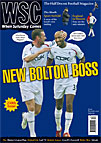 While Lilian Thuram has made some notable left-wing gestures, one of his black predecessors in the France defence has made a sudden switch to the right. Andy Brassell reports
While Lilian Thuram has made some notable left-wing gestures, one of his black predecessors in the France defence has made a sudden switch to the right. Andy Brassell reports
Basile Boli’s appointment as national secretary for co‑development with President Nicolas Sarkozy’s UMP party has been on the cards for a while. It may seem surreal to those who remember the robust defender scoring the winner in Marseille’s 1993 Champions League final win over Milan, getting away with headbutting Stuart Pearce during Euro 92, or indeed helping his mate Chris Waddle reprise his recording career post-Diamond Lights (with the Anglo-French duet We’ve Got A Feeling). Yet though Boli’s career since playing retirement – which came in 1997, at the tender age of 30 – has included media work for the TV channel France 3, it has otherwise been quite atypical for an ex-pro.
He is primarily a businessman now – he founded and now runs two companies, one in sports marketing and the other TV production. Nevertheless, hooking up with Sarkozy may raise an eyebrow or two among some. After all, in Black Boli, his 1994 book describing the events around the Marseille/Valenciennes match-fixing scandal, Boli accused his team-mate Jean-Pierre Papin of being racist, an accusation also levelled against Sarkozy by Lilian Thuram on more than one occasion.
A common mistake is to group Boli with 1998’s “black-blanc-beur” (black-white-Arab) team, which so antagonised Jean-Marie Le Pen and then made the far-right candidate look a fool on their way to winning the World Cup. Though in broadly the same age bracket as Thuram, Boli played his last match for les Bleus in 1993, sitting out the final stages of the disastrous qualifying campaign for USA 94 with a knee injury.
The change in the atmosphere around the France team in the four years between those two World Cups was immense. Gérard Houllier’s team were synonymous with despondency and failure. Thuram’s generation, meanwhile, were not just successful but politicised by their success in 1998 and its unfolding against the background of Le Pen’s nationalist agenda. Their success gave not just the articulate Thuram but others in the squad the platform and the impetus to speak out on social issues.
Boli, who was born in Ivory Coast, has never been as politically outspoken. He did have an ambassadorial role in negotiating the release of the Ivorian national side with Robert Gueï in February 2000, after the country’s military leader at the time detained the players and threatened them with national service after their early African Nations Cup exit. Despite in his words “coming from the left”, he rejected an approach from the Socialist party to represent them in regional elections towards the end of last year before accepting the UMP’s invitation.
Boli has known Sarkozy for a while – they’ve lived opposite one another in the posh Parisian suburb of Neuilly. Interestingly, while Sarkozy said in a brief speech welcoming him to the party in February that he intended Boli’s mission to be about “embracing the diversity of France”, Boli himself has said he was attracted to the party by Sarkozy’s strict immigration proposals. As president of the organisation Entreprendre et Réussir en Afrique (Starting Up and Succeeding in Africa), he signed an agreement to aid the repatriation of sans papiers (immigrants without documentation) to African countries in September 2007.
It’s difficult not to compare this with the actions of Thuram, the most politically visible of his peers. He and Patrick Vieira invited around 70 African sans papiers to France’s Euro 2008 qualifier against Italy in September 2006 as their guests, something that predictably received plenty of right/centre-right criticism, although Thuram, while unapologetic, said it was only intended to facilitate dialogue on the subject.
Thuram is always understanding of criticism from those who say that, as a highly paid footballer, he is too far removed from the problems he comments on for his words to have any real meaning. He seems more concerned about doing what he believes to be the right thing rather than guarding his image against charges of hypocrisy. After initially refusing the opportunity to meet Socialist presidential candidate Ségolène Royal, he went for dinner with her in January, despite being keen to avoid being used for publicity and endorsing any candidate.
This, you suspect, is what marks Thuram out as politically interested rather than actually being a politician. Conversely, Boli has jockeyed for position before making his move, rather like a player negotiating a transfer. “All my life, I’ve wanted to be the best. Today, the best is Nicolas Sarkozy,” he announced after aligning himself with the UMP. For Boli, it appears, politics is a career choice, while for Thuram it is more a matter of personal conscience.
From WSC 250 December 2007